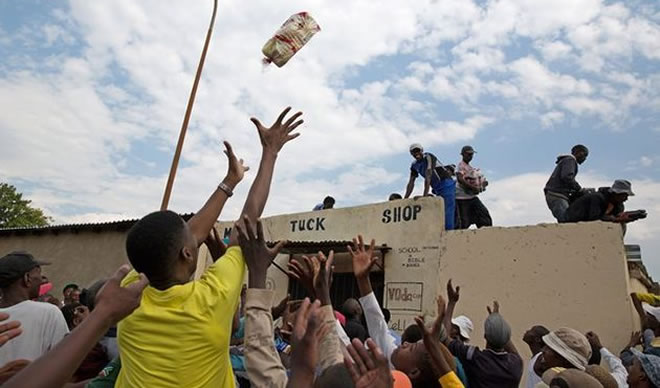Over the past few weeks, more than 1,000 shops owned by immigrants from Somalia, Ethiopia, Pakistan, Bangladesh and elsewhere have been looted in townships around Johannesburg

People attempt to catch a loaf of stolen bread thrown by one of a mob of youths looting a shop in Meadowlands, Soweto. Image by: JAMES OATWAY Sunday Times.

By Rebecca Fasselt
Saturday, February 7, 2015
JOHANNESBURG - The recent looting of shops owned by African and Asian immigrants poses an ideological threat to the party that has ruled South Africa since the end of apartheid, a prominent scholar has suggested.
"The violence is an effort by individuals, or a group, to achieve economic advancement, political power or recognition, or a sense of social or criminal justice," Prof. Loren Landau, the South African Research Chair on Mobility and the Politics of Difference at the University of the Witwatersrand, told The Anadolu Agency.
Over the past few weeks, more than 1,000 shops owned by immigrants from Somalia, Ethiopia, Pakistan, Bangladesh and elsewhere have been looted in townships around Johannesburg.
Officials have shied away from labeling the violence "xenophobia" per se, suggesting that the incidents were mere petty crime.
"The police may wish to draw attention to the criminal aspect of these acts, as xenophobia is neither a crime nor something they feel they can investigate," said Landau.
"Indeed, for better or worse, much of the government's efforts to address this unrest has been framed as an issue of law and order, and this has enabled police and the military to respond with great force and speed," he added.
But Landau, a prominent migration expert, fears more is at stake.
"Accepting that the poor black population is angry, differentiated, discriminatory and organized represents a visible threat to the African National Congress (ANC) and its political project," he said.
"Rather than a unified and inclusive citizenry that continues to struggle against the legacy of white oppression, we see a black population that is willing to turn on foreigners and other South African 'outsiders' in ways that reject the party's political legitimacy and promises," Landau asserted.
The ANC, which defines itself as social democratic party, has ruled South Africa since the end of the apartheid era and the establishment of multi-racial democracy in 1994.
The party says it seeks to address socio-economic differences resulting from apartheid-era policies and empower citizens socially, economically and politically.
Demonizing
Prof. Landau said the intensity of the recent looting had to be seen within the context of a "longstanding political discourse that demonizes outsiders – both foreigners and domestic migrants."
He suggested that violent riots were often acts of "retribution for a perceived misdeed."
The unrest started after 14-year-old Siphiwe Mahori was shot in Soweto – allegedly by a Somali shop owner.
The boy had reportedly taken part in looting the shop.
Violence against African immigrants has been commonplace in South Africa since the early years of the country's transition to democracy.
In 2008, 62 people – mostly African immigrants but also 21 South Africans – were killed, dozens wounded, and more than 100,000 people displaced in xenophobic attacks.
After two weeks of extreme violence, townships and informal settlements across the country had become scenes of destruction, with 342 foreign-owned shops having been looted and 213 torched.
The image of Mozambican Ernesto Alfabeto Nhamuave being burnt to death in the Alexandra Township shocked the world and exposed the deep-seated fissures within the so-called "rainbow nation."
There has been much debate since the 2008 attacks about the specific targets of the violence and whether xenophobia could adequately explain the phenomenon.
The most visible targets have been foreigners from other African countries.
But Landau says that similar violence has also been meted out against South Africans who happened to be from the wrong place, village or group.
"In some instances, these are South Africans of Asian descent, who are called 'Kwerekweres' [a derogatory term for foreigners] and told to 'go home,'" he said.
"In many more instances, however, it is other black South Africans who are seen as economically, politically or socially threating," he added. "In all cases, people are seen as less entitled to resources – jobs, houses, services and women – because they aren't locals."
The scholar believes that any single term is unlikely to sum up the full range of motivations and interests that lead to repeated patterns of violence.
"However, xenophobia in its broadest definition – a fear or resentment of outsiders – is an important ingredient in much of the mobilization," he said.
Some scholars have explained the violence as "negrophobia" or "Afrophobia," suggesting that the targeting of foreigners from elsewhere on the African continent was rooted in a devalued self-image encouraged by a legacy of colonialism and apartheid.
Landau noted that there had not yet been any anti-white attacks.
"Some cite this as evidence of Afrophobia," he said. "However, the absence of attacks is not the same as evidence against anti-white resentment or a willingness to do harm."
He went on to argue that if whites ran shops in townships – or supported ward-level political or social groups in largely black areas in ways that were threatening to the powers that be – violence would likely follow.
While there have been a number of initiatives undertaken by the government and others since 2008 aimed at combating the trend, Landau explained, these had mostly failed to bear fruit.
"They relied on the reconciliation model used during the country's transition," he said.
He added, however, that those perpetrating the violence generally did not take part in education or awareness programs.
"Until the government is willing to expose the ill-behavior of businesspeople, police and political leaders, these efforts will come to little," the professor contended.